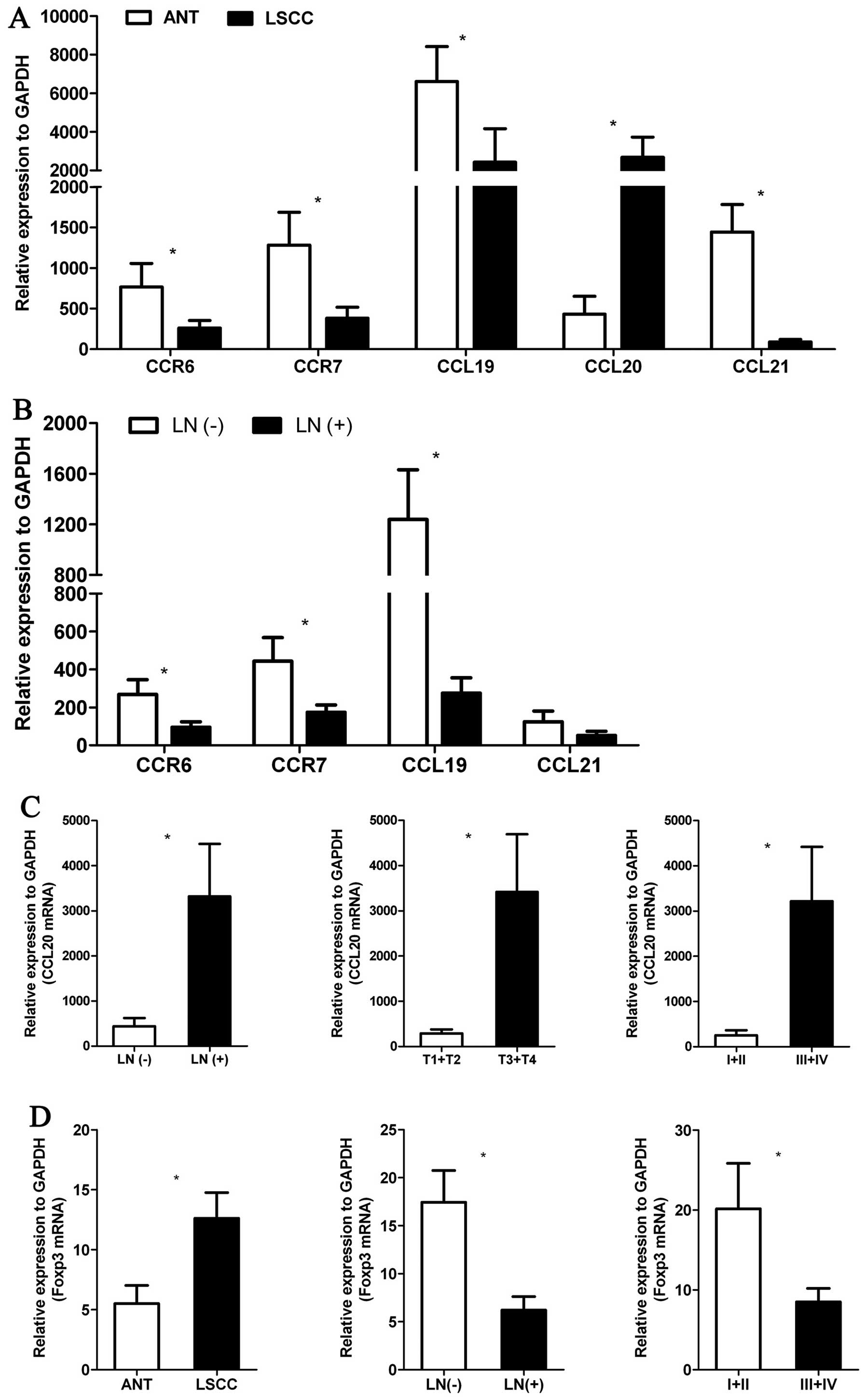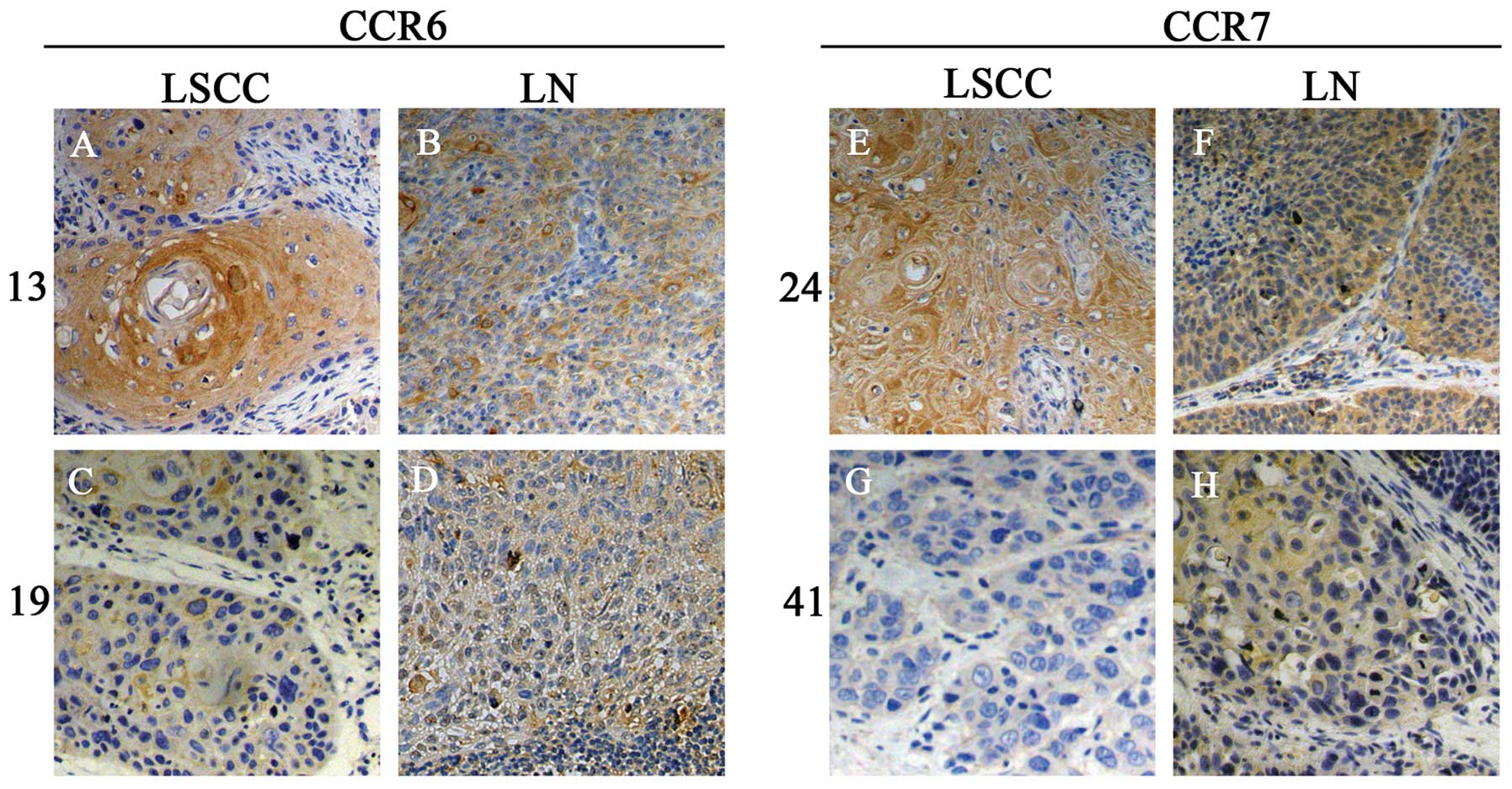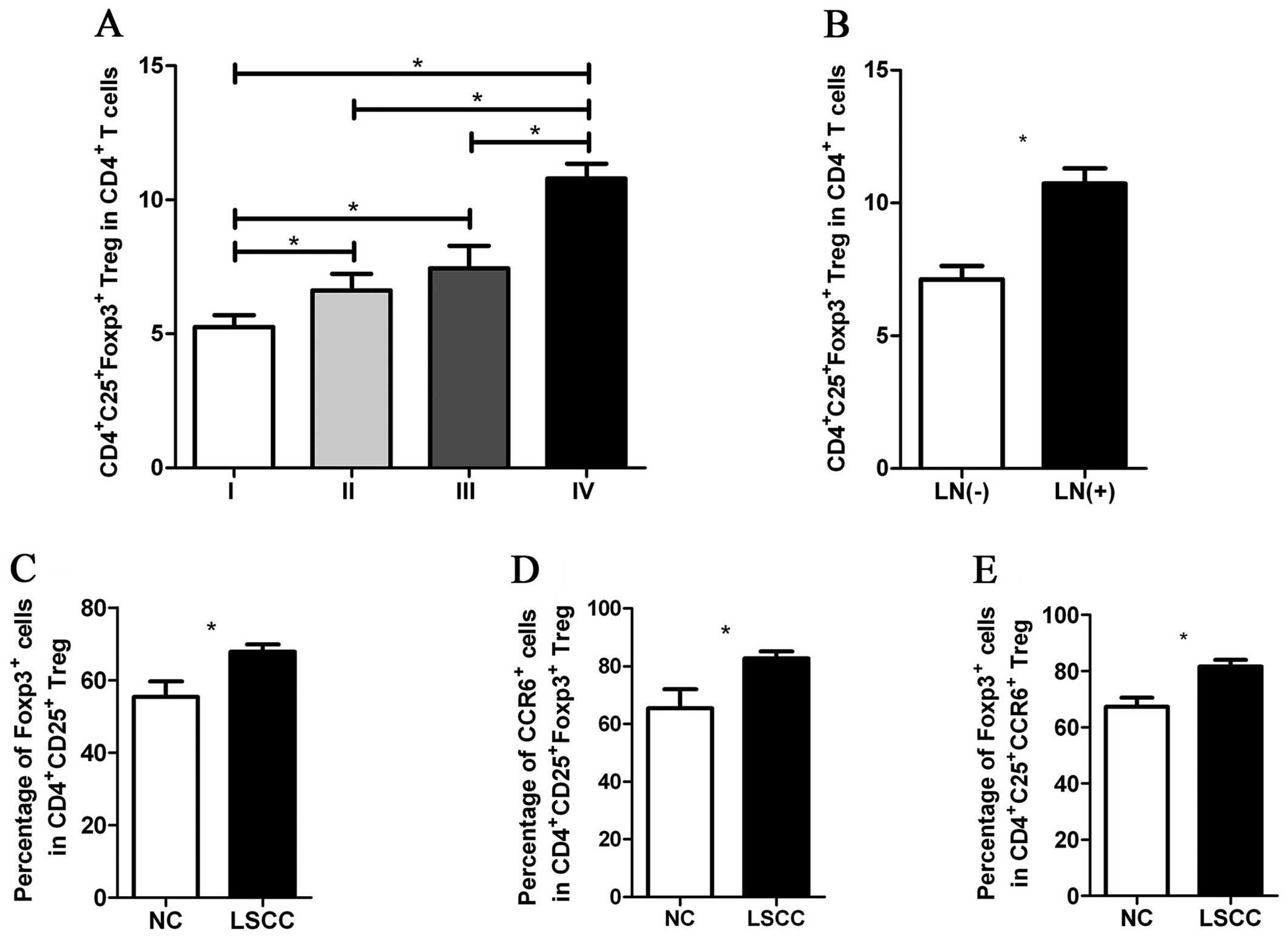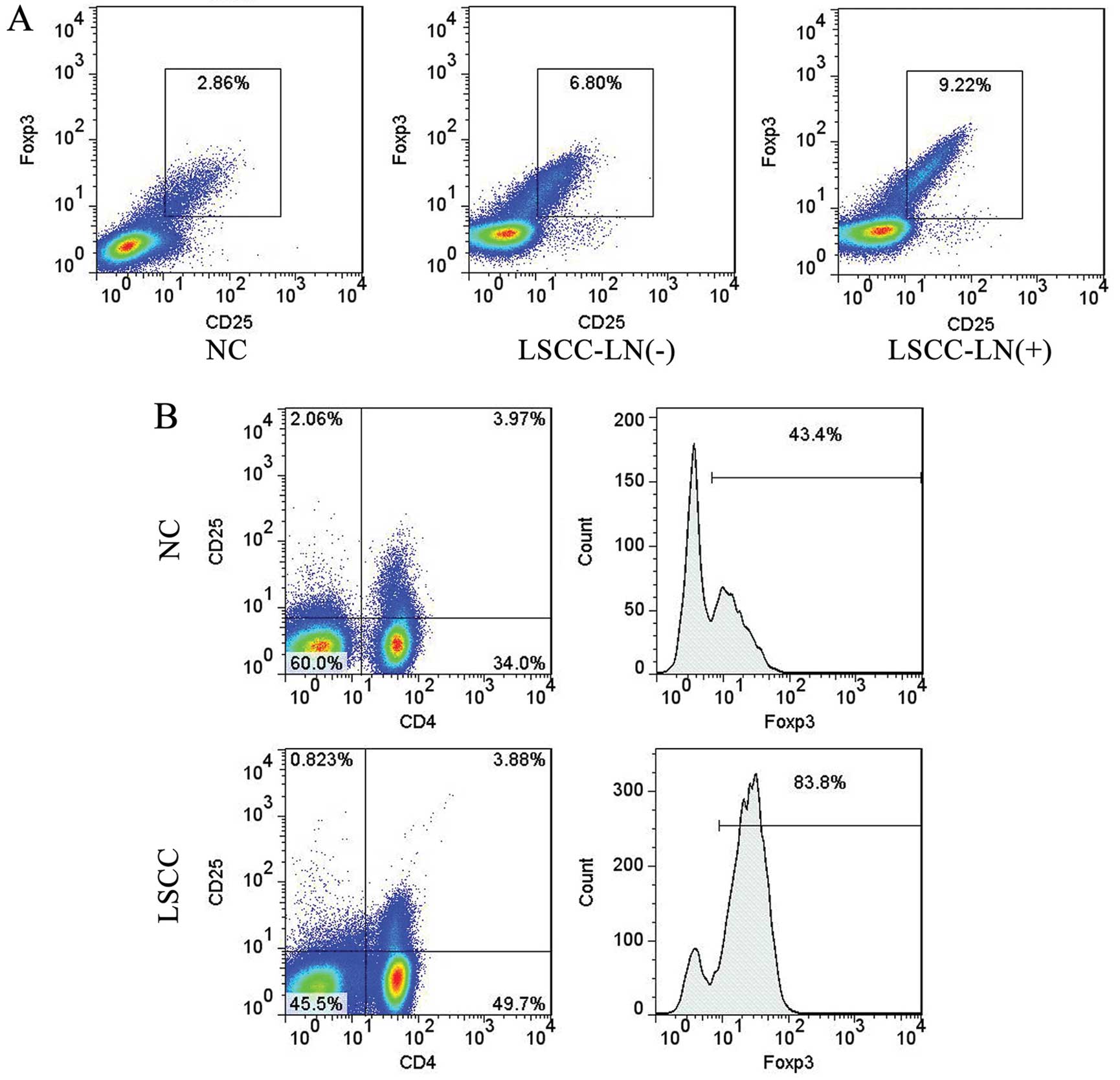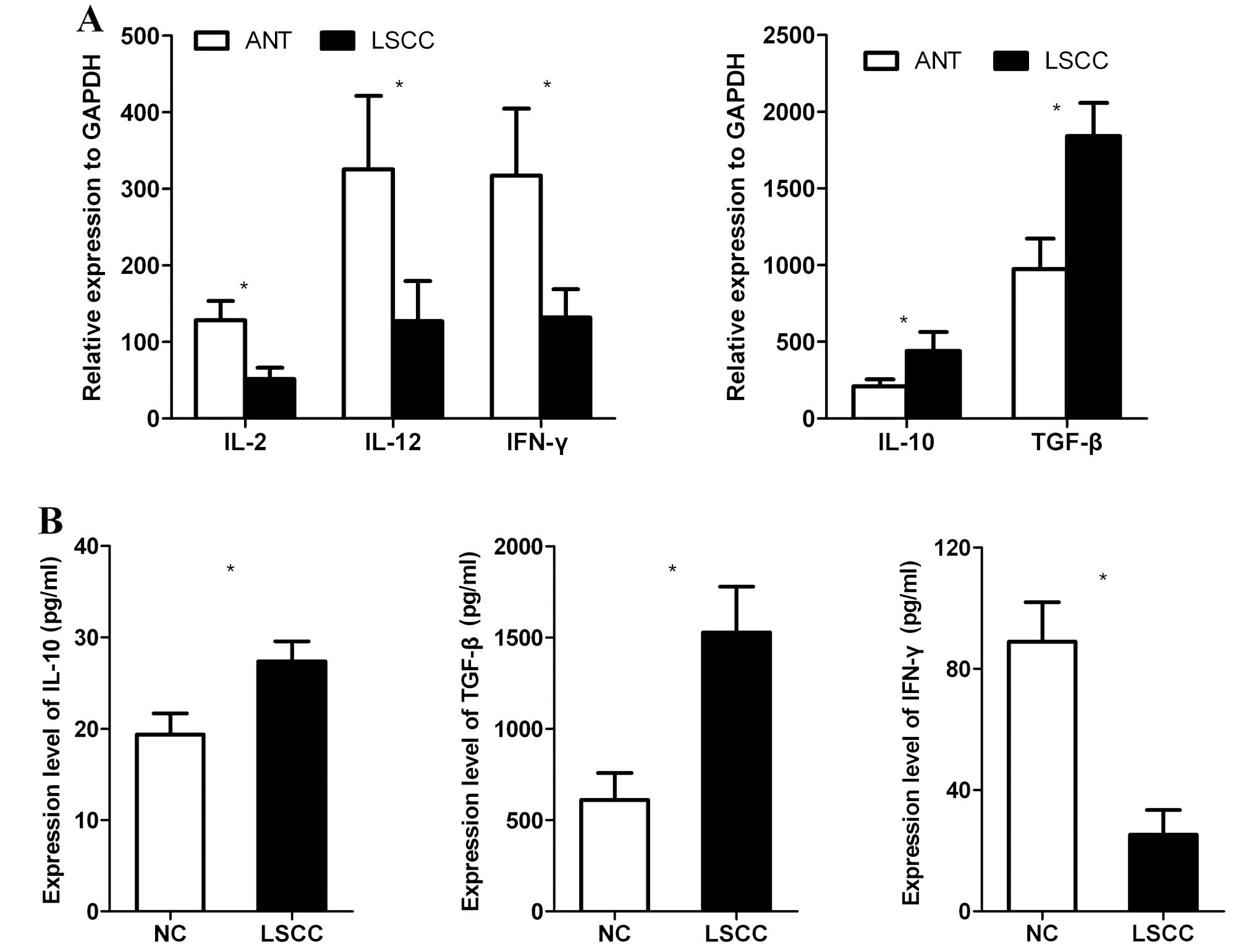|
1
|
Marioni G, Marchese-Ragona R, Cartei G,
Marchese F and Staffieri A: Current opinion in diagnosis and
treatment of laryngeal carcinoma. Cancer Treat Rev. 32:504–515.
2006. View Article : Google Scholar : PubMed/NCBI
|
|
2
|
Hoffman HT, Porter K, Karnell LH, et al:
Laryngeal cancer in the United States: changes in demographics,
patterns of care, and survival. Laryngoscope. 116:1–13. 2006.
View Article : Google Scholar : PubMed/NCBI
|
|
3
|
Shah JP, Karnell LH, Hoffman HT, et al:
Patterns of care for cancer of the larynx in the United States.
Arch Otolaryngol Head Neck Surg. 123:475–483. 1997. View Article : Google Scholar : PubMed/NCBI
|
|
4
|
Alhamarneh O, Agada F, Madden L, Stafford
N and Greenman J: Serum IL10 and circulating CD4(+) CD25(high)
regulatory T cell numbers as predictors of clinical outcome and
survival in patients with head and neck squamous cell carcinoma.
Head Neck. 33:415–423. 2011.
|
|
5
|
Whiteside TL: The tumor microenvironment
and its role in promoting tumor growth. Oncogene. 27:5904–5912.
2008. View Article : Google Scholar : PubMed/NCBI
|
|
6
|
Zou W: Regulatory T cells, tumour immunity
and immunotherapy. Nat Rev Immunol. 6:295–307. 2006. View Article : Google Scholar : PubMed/NCBI
|
|
7
|
Roncarolo MG, Bacchetta R, Bordignon C,
Narula S and Levings MK: Type 1 T regulatory cells. Immunol Rev.
182:68–79. 2001. View Article : Google Scholar : PubMed/NCBI
|
|
8
|
Dieckmann D, Plottner H, Berchtold S,
Berger T and Schuler G: Ex vivo isolation and characterization of
CD4(+)CD25(+) T cells with regulatory properties from human blood.
J Exp Med. 193:1303–1310. 2001.
|
|
9
|
Jonuleit H, Schmitt E, Stassen M,
Tuettenberg A, Knop J and Enk AH: Identification and functional
characterization of human CD4(+)CD25(+) T cells with regulatory
properties isolated from peripheral blood. J Exp Med.
193:1285–1294. 2001.
|
|
10
|
Levings MK, Sangregorio R and Roncarolo
MG: Human cd25(+)cd4(+) T regulatory cells suppress naive and
memory T cell proliferation and can be expanded in vitro without
loss of function. J Exp Med. 193:1295–1302. 2001.
|
|
11
|
Chen Y, Kuchroo VK, Inobe J, Hafler DA and
Weiner HL: Regulatory T cell clones induced by oral tolerance:
suppression of autoimmune encephalomyelitis. Science.
265:1237–1240. 1994. View Article : Google Scholar : PubMed/NCBI
|
|
12
|
Sakaguchi S, Yamaguchi T, Nomura T and Ono
M: Regulatory T cells and immune tolerance. Cell. 133:775–787.
2008. View Article : Google Scholar : PubMed/NCBI
|
|
13
|
Sakaguchi S, Miyara M, Costantino CM and
Hafler DA: Foxp3+ regulatory T cells in the human immune
system. Nat Rev Immunol. 10:490–500. 2010.
|
|
14
|
Xu L, Xu W, Wen Z and Xiong S: In situ
prior proliferation of CD4+ CCR6+ regulatory
T cells facilitated by TGF-β secreting DCs is crucial for their
enrichment and suppression in tumor immunity. PLoS One.
6:e202822011.PubMed/NCBI
|
|
15
|
Wei S, Kryczek I and Zou W: Regulatory
T-cell compartmentalization and trafficking. Blood. 108:426–431.
2006. View Article : Google Scholar : PubMed/NCBI
|
|
16
|
Zhu J and Paul WE: CD4 T cells: fates,
functions, and faults. Blood. 112:1557–1569. 2008. View Article : Google Scholar : PubMed/NCBI
|
|
17
|
Mburu YK, Wang J, Wood MA, Walker WH and
Ferris RL: CCR7 mediates inflammation-associated tumor progression.
Immunol Res. 36:61–72. 2006. View Article : Google Scholar : PubMed/NCBI
|
|
18
|
Schutyser E, Struyf S and Van Damme J: The
CC chemokine CCL20 and its receptor CCR6. Cytokine Growth Factor
Rev. 14:409–426. 2003. View Article : Google Scholar : PubMed/NCBI
|
|
19
|
Zlotnik A and Yoshie O: Chemokines: a new
classification system and their role in immunity. Immunity.
12:121–127. 2000. View Article : Google Scholar : PubMed/NCBI
|
|
20
|
Hirahara K, Liu L, Clark RA, Yamanaka K,
Fuhlbrigge RC and Kupper TS: The majority of human peripheral blood
CD4+CD25highFoxp3+ regulatory T
cells bear functional skin-homing receptors. J Immunol.
177:4488–4494. 2006.PubMed/NCBI
|
|
21
|
Wang J, Xi L, Hunt JL, et al: Expression
pattern of chemokine receptor 6 (CCR6) and CCR7 in squamous cell
carcinoma of the head and neck identifies a novel metastatic
phenotype. Cancer Res. 64:1861–1866. 2004. View Article : Google Scholar : PubMed/NCBI
|
|
22
|
Arya M, Patel HR and Williamson M:
Chemokines: key players in cancer. Curr Med Res Opin. 19:557–564.
2003. View Article : Google Scholar
|
|
23
|
Vinader V and Afarinkia K: A beginner’s
guide to chemokines. Future Med Chem. 4:845–852. 2012.
|
|
24
|
Tetu B, Popa I, Bairati I, et al:
Immunohistochemical analysis of possible chemoresistance markers
identified by micro-arrays on serous ovarian carcinomas. Mod
Pathol. 21:1002–1010. 2008. View Article : Google Scholar : PubMed/NCBI
|
|
25
|
Waugh DJ and Wilson C: The interleukin-8
pathway in cancer. Clin Cancer Res. 14:6735–6741. 2008. View Article : Google Scholar : PubMed/NCBI
|
|
26
|
Müller A, Homey B, Soto H, et al:
Involvement of chemokine receptors in breast cancer metastasis.
Nature. 410:50–56. 2001.PubMed/NCBI
|
|
27
|
Forster R, Davalos-Misslitz AC and Rot A:
CCR7 and its ligands: balancing immunity and tolerance. Nat Rev
Immunol. 8:362–371. 2008. View Article : Google Scholar : PubMed/NCBI
|
|
28
|
Mantovani A, Savino B, Locati M, Zammataro
L, Allavena P and Bonecchi R: The chemokine system in cancer
biology and therapy. Cytokine Growth Factor Rev. 21:27–39. 2010.
View Article : Google Scholar
|
|
29
|
Ghadjar P, Coupland SE, Na IK, et al:
Chemokine receptor CCR6 expression level and liver metastases in
colorectal cancer. J Clin Oncol. 24:1910–1916. 2006. View Article : Google Scholar : PubMed/NCBI
|
|
30
|
Wittekind C, Compton CC, Greene FL and
Sobin LH: TNM residual tumor classification revisited. Cancer.
94:2511–2516. 2002. View Article : Google Scholar : PubMed/NCBI
|
|
31
|
Pavelic ZP, Pavelic K, Carter CP and
Pavelic L: Heterogeneity of c-myc expression in histologically
similar infiltrating ductal carcinomas of the breast. J Cancer Res
Clin Oncol. 118:16–22. 1992. View Article : Google Scholar : PubMed/NCBI
|
|
32
|
Tao L, Zhou L, Zheng L and Yao M: Elemene
displays anti-cancer ability on laryngeal cancer cells in vitro and
in vivo. Cancer Chemother Pharmacol. 58:24–34. 2006. View Article : Google Scholar : PubMed/NCBI
|
|
33
|
Lefebvre JL and Ang KK: Larynx
preservation clinical trial design: key issues and recommendations
- a consensus panel summary. Head Neck. 31:429–441. 2009.
View Article : Google Scholar
|
|
34
|
Chen AY, Schrag N, Hao Y, et al: Changes
in treatment of advanced laryngeal cancer 1985–2001. Otolaryngol
Head Neck Surg. 135:831–837. 2006.
|
|
35
|
Holsinger FC and Weber RS: Swing of the
surgical pendulum: a return to surgery for treatment of head and
neck cancer in the 21st century? Int J Radiat Oncol Biol Phys.
69(Suppl 2): S129–S131. 2007. View Article : Google Scholar : PubMed/NCBI
|
|
36
|
Laccourreye O, Brasnu D, Bassot V, Menard
M, Khayat D and Laccourreye H: Cisplatin-fluorouracil exclusive
chemotherapy for T1-T3N0 glottic squamous cell carcinoma complete
clinical responders: five-year results. J Clin Oncol. 14:2331–2336.
1996.
|
|
37
|
Lefebvre JL, Rolland F, Tesselaar M, et
al: Phase 3 randomized trial on larynx preservation comparing
sequential vs alternating chemotherapy and radiotherapy. J Natl
Cancer Inst. 101:142–152. 2009. View Article : Google Scholar : PubMed/NCBI
|
|
38
|
Stenson KM, Maccracken E, Kunnavakkam R,
et al: Chemoradiation for patients with large-volume laryngeal
cancers. Head Neck. 34:1162–1167. 2012.PubMed/NCBI
|
|
39
|
Beider K, Abraham M, Begin M, et al:
Interaction between CXCR4 and CCL20 pathways regulates tumor
growth. PLoS One. 4:e51252009. View Article : Google Scholar : PubMed/NCBI
|
|
40
|
Bonnotte B, Crittenden M, Larmonier N,
Gough M and Vile RG: MIP-3alpha transfection into a rodent tumor
cell line increases intratumoral dendritic cell infiltration but
enhances (facilitates) tumor growth and decreases immunogenicity. J
Immunol. 173:4929–4935. 2004. View Article : Google Scholar
|
|
41
|
Cabioglu N, Yazici MS, Arun B, et al: CCR7
and CXCR4 as novel biomarkers predicting axillary lymph node
metastasis in T1 breast cancer. Clin Cancer Res. 11:5686–5693.
2005. View Article : Google Scholar : PubMed/NCBI
|
|
42
|
Shang ZJ, Liu K and Shao Z: Expression of
chemokine receptor CCR7 is associated with cervical lymph node
metastasis of oral squamous cell carcinoma. Oral Oncol. 45:480–485.
2009. View Article : Google Scholar : PubMed/NCBI
|
|
43
|
Takanami I: Overexpression of CCR7 mRNA in
nonsmall cell lung cancer: correlation with lymph node metastasis.
Int J Cancer. 105:186–189. 2003. View Article : Google Scholar : PubMed/NCBI
|
|
44
|
Chen KJ, Lin SZ, Zhou L, et al: Selective
recruitment of regulatory T cell through CCR6-CCL20 in
hepatocellular carcinoma fosters tumor progression and predicts
poor prognosis. PLoS One. 6:e246712011. View Article : Google Scholar : PubMed/NCBI
|
|
45
|
Annunziato F, Cosmi L, Liotta F, et al:
Phenotype, localization, and mechanism of suppression of
CD4(+)CD25(+) human thymocytes. J Exp Med. 196:379–387. 2002.
|
|
46
|
Iellem A, Mariani M, Lang R, et al: Unique
chemotactic response profile and specific expression of chemokine
receptors CCR4 and CCR8 by CD4(+)CD25(+) regulatory T cells. J Exp
Med. 194:847–853. 2001.PubMed/NCBI
|
|
47
|
Xu L, Xu W, Qiu S and Xiong S: Enrichment
of CCR6+Foxp3+ regulatory T cells in the
tumor mass correlates with impaired CD8+ T cell function
and poor prognosis of breast cancer. Clin Immunol. 135:466–475.
2010.PubMed/NCBI
|
|
48
|
Kosmaczewska A, Ciszak L, Potoczek S and
Frydecka I: The significance of Treg cells in defective tumor
immunity. Arch Immunol Ther Exp (Warsz). 56:181–191. 2008.
View Article : Google Scholar : PubMed/NCBI
|
|
49
|
Mao C, Wang S, Jiang Q, et al: Increased
CD4+CD25+Foxp3+ regulatory T cells
in cancer patients from conversion of
CD4+CD25− T cells through tumor-derived
factors. Onkologie. 31:243–248. 2008.
|
|
50
|
Pakravan N, Hassan AT and Hassan ZM:
Naturally occurring self-reactive CD4+CD25+
regulatory T cells: universal immune code. Cell Mol Immunol.
4:197–201. 2007.
|
|
51
|
Strauss L, Bergmann C, Szczepanski M,
Gooding W, Johnson JT and Whiteside TL: A unique subset of
CD4+CD25highFoxp3+ T cells
secreting interleukin-10 and transforming growth factor-beta1
mediates suppression in the tumor microenvironment. Clin Cancer
Res. 13:4345–4354. 2007.PubMed/NCBI
|
|
52
|
Sakaguchi S: Naturally arising
Foxp3-expressing CD25+CD4+ regulatory T cells
in immunological tolerance to self and non-self. Nat Immunol.
6:345–352. 2005. View
Article : Google Scholar : PubMed/NCBI
|
|
53
|
Ebert LM, Tan BS, Browning J, et al: The
regulatory T cell-associated transcription factor FoxP3 is
expressed by tumor cells. Cancer Res. 68:3001–3009. 2008.
View Article : Google Scholar : PubMed/NCBI
|
|
54
|
Karanikas V, Speletas M, Zamanakou M, et
al: Foxp3 expression in human cancer cells. J Transl Med. 6:192008.
View Article : Google Scholar : PubMed/NCBI
|
|
55
|
Ladoire S, Arnould L, Mignot G, et al:
Presence of Foxp3 expression in tumor cells predicts better
survival in HER2-overexpressing breast cancer patients treated with
neoadjuvant chemotherapy. Breast Cancer Res Treat. 125:65–72. 2011.
View Article : Google Scholar
|
|
56
|
O’Hayre M, Salanga CL, Handel TM and Allen
SJ: Chemokines and cancer: migration, intracellular signalling and
intercellular communication in the microenvironment. Biochem J.
409:635–649. 2008.PubMed/NCBI
|
|
57
|
Ito S, Ozawa S, Ikoma T, Yajima N, Kiyono
T and Hata R: Expression of a chemokine BRAK/CXCL14 in oral floor
carcinoma cells reduces the settlement rate of the cells and
suppresses their proliferation in vivo. Biomed Res. 31:199–206.
2010. View Article : Google Scholar : PubMed/NCBI
|
|
58
|
Silva TA, Ribeiro FL, Oliveira-Neto HH, et
al: Dual role of CCL3/CCR1 in oral squamous cell carcinoma:
Implications in tumor metastasis and local host defense. Oncol Rep.
18:1107–1113. 2007.PubMed/NCBI
|
|
59
|
Sakaguchi S, Sakaguchi N, Asano M, Itoh M
and Toda M: Immunologic self-tolerance maintained by activated T
cells expressing IL-2 receptor α-chains (CD25). Breakdown of a
single mechanism of self-tolerance causes various autoimmune
diseases. J Immunol. 155:1151–1164. 1995.
|
|
60
|
DiPersio JF, Micallef IN, Stiff PJ, et al:
Phase III prospective randomized double-blind placebo-controlled
trial of plerixafor plus granulocyte colony-stimulating factor
compared with placebo plus granulocyte colony-stimulating factor
for autologous stem-cell mobilization and transplantation for
patients with non-Hodgkin’s lymphoma. J Clin Oncol. 27:4767–4773.
2009.PubMed/NCBI
|















